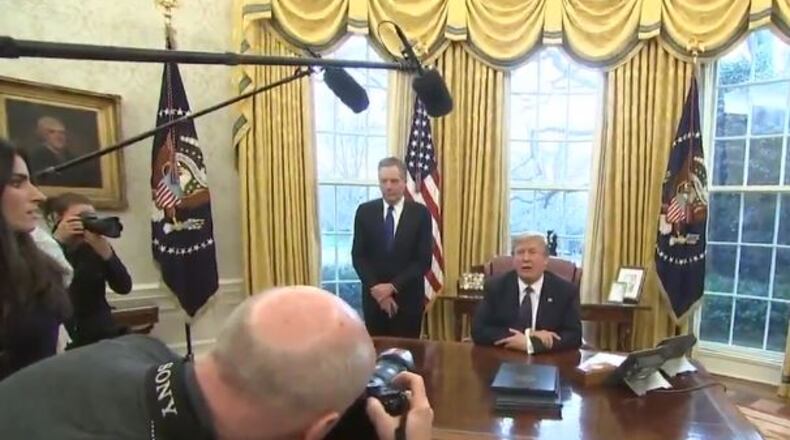The White House on Tuesday staked out a hard line on immigration negotiations in the Congress, as lawmakers in both parties tried to sort out how best to reach an agreement by February 8 to deal with nearly 700,000 thousand illegal immigrants who were brought to the United States as children, under the Obama Administration's DACA program.
"I'd like to leave no doubt as to where the President stands on the Flake-Graham-Durbin agreement on immigration reform," said White House Press Secretary Sarah Huckabee Sanders, referring to a bipartisan DACA plan worked out by six Senators last week.
"In short, it is totally unacceptable to the President, and should be declared 'dead on arrival," Sanders declared.
Sanders said Mr. Trump is ready to accept a deal on illegal immigrant "Dreamers," but only if there are real efforts on border security, an end to the diversity visa lottery, and an end to so-called chain migration.
On Capitol Hill, where members were moving on past a three-day government shutdown, which was forced in part by an impasse over DACA, there were no indications that an immigration deal was near.
"We must finally pass a bill to protect the Dreamers," said Senate Democratic Leader Charles Schumer, who won the assurance of Republicans that if no deal could be struck on immigration by February 8, then the matter would be brought to the Senate floor for a full debate.
"The clock is ticking," Schumer said Wednesday on the Senate floor. "Sixteen days. We've got to get moving."
But as Schumer was making that statement, news organizations were reporting that he had rescinded an earlier offer to the President, in which Democrats said they would back money for a border wall, in exchange for DACA protections for the Dreamers.
Democrats also acknowledged that to get a bill through the Senate, they will need 60 votes to overcome any filibuster - and that means they will have to compromise with Republicans, and likely give in on some immigration matters.
One uncertainty at this point is how DACA recipients should be dealt with.
Under the bipartisan plan which has already been rejected by the White House, the "Dreamers" would have a path to citizenship - but it would take them 12 years to get to that point.
But for a lot of Republicans - especially in the House - any pathway to possible citizenship is a non-starter, as many GOP lawmakers say will not accept anything that looks like "amnesty."
"There is a deal to be made," said House Republican Whip Steve Scalise (R-LA) of immigration. "But in my mind, that would not include amnesty."
"I think it would be a serious mistake for us to pass an amnesty bill, providing amnesty and a path to citizenship, for millions of people who are here illegally," said Sen. Ted Cruz (R-TX).
"I think that would be an enormous mistake," Cruz added.
Under a Republican immigration plan that's been unveiled in the House, DACA recipients would have no path to citizenship - instead, they would be eligible for a renewable three year legal status to stay in the United States.
To many Democrats, ideas like that are a non-starter as well.
Making negotiations somewhat more difficult is that it's not clear exactly what the President would accept on illegal immigrant "Dreamers" - it was described Tuesday only as a 'permanent solution' to DACA - it's not clear if that means citizenship, a permanent legal status, or a temporary one.
On the other side, the President has made clear that he wants money - maybe as much as $20 billion in 2018 - just to build a wall along the Mexican border.
Sen. Schumer said he had offered that to the President late last week, but on Tuesday, the Senate Democratic Leader made clear that offer was no longer valid. But Mr. Trump has other ideas.
While Schumer has a promise for a debate on the Senate floor if no deal is reached, there is no guarantee that the House would even vote for an immigration bill approved by the Senate.
Two weeks ago, the President said he was ready 'to take the heat' for lawmakers on immigration and broader immigration reform, and basically said whatever deal they could make in Congress, he would sign that package into law.
But that changed after the intervention of more conservative Republicans in Congress, and some top White House aides.
The deadline for action set by the President on DACA is March 5.
About the Author
The Latest
Featured



